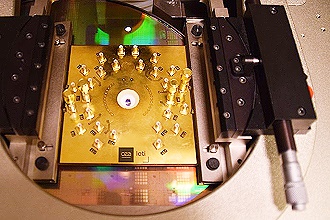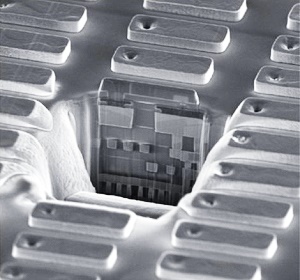CEA-Leti Paper in Nature Communications Reports First Complete Memristor-Based Bayesian Neural Network Implementation For Real-World Task |

Press Release Archives: 2024 | 2023 | 2022 | 2021 |2020 2019 | 2018 | 2017 | 2016 | 2015 2014 | 2013 | 2012 | 2011 | 2010 2009 | 2008 | 2007 | 2006 | 2005 Content is copyright of company represented. Page format, custom text and images are RF Cafe copyright - do not distribute.
Breakthrough Classifies Types of Arrhythmia Recordings With Precise Aleatoric and Epistemic Uncertainty
Wafer-level characterization of memristor crossbar arrays using a prober, highlighting detailed probe card analysis at an enlarged scale.
Scanning Electron Microscopy image of a filamentary memristor in the back end of line of our hybrid memristor/CMOS process. Grenoble, France - Dec. 7, 2023 - Considering medical-diagnosis and other safety-critical, sensory-processing applications that require accurate decisions based on a small amount of noisy input data, the study notes that while Bayesian neural networks excel at such tasks because they provide predictive uncertainty assessment, their probabilistic nature requires increased use of energy and computation. The increase is caused by the fact that implementing the networks in hardware requires a random number generator to store the probability distributions, i.e. synaptic weights. "Our paper presents, for the first time, a complete hardware implementation of a Bayesian neural network utilizing the intrinsic variability of memristors to store these probability distributions," said Elisa Vianello, CEA-Leti chief scientist. "We exploited the intrinsic variability of memristors to store these probability distributions, instead of using random number generators." A team comprising CEA-Leti, CEA-List and two CNRS laboratories has published a new paper in Nature Communications presenting the first complete memristor-based Bayesian neural network implementation for a real-world task—classifying types of arrhythmia recordings with precise aleatoric and epistemic uncertainty. Considering medical-diagnosis and other safety-critical, sensory-processing applications that require accurate decisions based on a small amount of noisy input data, the study notes that while Bayesian neural networks excel at such tasks because they provide predictive uncertainty assessment, their probabilistic nature requires increased use of energy and computation. The increase is caused by the fact that implementing the networks in hardware requires a random number generator to store the probability distributions, i.e. synaptic weights. "Our paper presents, for the first time, a complete hardware implementation of a Bayesian neural network utilizing the intrinsic variability of memristors to store these probability distributions," said Elisa Vianello, CEA-Leti chief scientist and co-author of the paper, "Bringing Uncertainty Quantification to the Extreme-Edge with Memristor-Based Bayesian Neural Networks". "We exploited the intrinsic variability of memristors to store these probability distributions, instead of using random number generators." A second major challenge was that performing inference in the team's approach requires massive parallel multiply-and-accumulate (MAC) operations. "These operations are power-hungry when carried out on CMOS-based ASICs and field-programmable gate arrays, due to the shuttling of data between processor and memory," Vianello said. "In our solution, we use crossbars of memristors that naturally implement the multiplication between the input voltage and the probabilistic synaptic weight through Ohm's law, and the accumulation through Kirchhoff's current law, to significantly lower power consumption." Reconciling Memristors and Bayesian Neural Networks Co-author Damien Querlioz, a scientist associated with the University of Paris-Saclay, the French National Center for Scientific Research (CNRS) and the Center of Nanosciences and Nanotechnologies, said the team also had to reconcile the nature of memristors, whose statistical effects adhere to the laws of device physics, with Bayesian neural networks, in which these effects can take arbitrary shapes. "This work overcomes that challenge with a new training algorithm - variational inference augmented by a 'technological loss' - that accommodates device non-idealities during the learning phase," he said. "Our approach enables the Bayesian neural network to be compatible with the imperfections of our memristors." Uncertainty quantification involves the network's ability to identify unknown situations out-of-distributions. If a traditional neural network trained to recognize cats and dogs is presented with an image of a giraffe, it "confidently misclassifies" it as a cat or a dog, Vianello said. "In contrast, a Bayesian neural network would respond, 'I am not entirely sure what this is because I have never seen it.' While this example is lighthearted, in critical environments like medical diagnosis, where incorrect predictions can have severe consequences, this uncertainty-capturing ability becomes crucial." This capability arises from the fact that synaptic values in Bayesian neural networks are not precise values, as in traditional neural networks, but rather probability distributions. Consequently, the output is also a probability distribution, providing information about its "certainty". Scanning Electron Microscopy image of a filamentary memristor in the back end of line of our hybrid memristor/CMOS process About CEA-Leti (France) CEA-Leti, a technology research institute at CEA, is a global leader in miniaturization technologies enabling smart, energy-efficient and secure solutions for industry. Founded in 1967, CEA-Leti pioneers micro-& nanotechnologies, tailoring differentiating applicative solutions for global companies, SMEs and startups. CEA-Leti tackles critical challenges in healthcare, energy and digital migration. From sensors to data processing and computing solutions, CEA-Leti's multidisciplinary teams deliver solid expertise, leveraging world-class pre-industrialization facilities. With a staff of more than 2,000 talents, a portfolio of 3,200 patents, 11,000 sq. meters of cleanroom space and a clear IP policy, the institute is based in Grenoble, France, and has offices in Silicon Valley, Brussels and Tokyo. CEA-Leti has launched 75 startups and is a member of the Carnot Institutes network. Follow us on www.leti-cea.com and @CEA_Leti. Technological expertise CEA has a key role in transferring scientific knowledge and innovation from research to industry. This high-level technological research is carried out in particular in electronic and integrated systems, from microscale to nanoscale. It has a wide range of industrial applications in the fields of transport, health, safety and telecommunications, contributing to the creation of high-quality and competitive products. For more information: www.cea.fr/english Contact Info Sarah-Lyle Dampoux CEA-Leti Press Contact Agency E-mail: sldampoux@mahoneylyle.com Phone: +33 6 74 93 23 47
Posted December 8, 2023 |


